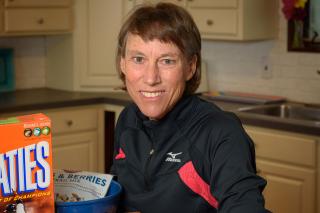Nancy Clark is a registered dietitian and board-certified specialist in sports dietetics. She has a private sports nutrition practice in Newton, Massachusetts. She has served as Team Nutritionist for the Boston Red Sox, and early in her career consulted with both the Celtics and the Bruins. She is one of the first sports nutritionists in the U.S. and author of the best-selling book, Nancy Clark’s Sports Nutrition Guidebook (Human Kinetics Publishers, 6th edition, 2020). We chatted with Clark about how she developed a career that didn’t exist while she was at Simmons.
What led you to Simmons?
I had been attending boarding school at Northfield (now Northfield Mount Herman), where I worked in the kitchen and learned about quantity cooking. It fascinated me! I knew I wanted to do something related to food and nutrition, and I wanted to be in a city after growing up in a small town.
What inspired you to pursue the (then nascent) field of sports nutrition?
After Simmons, I completed a dietetic internship at Massachusetts General Hospital. Later, I worked for the New England Dairy & Food Council to be a nutrition educator and teach other educators about nutrition. One group I taught were coaches. They were fun and interesting, and piqued my curiosity to learn more about how nutrition and sports connected. I was also doing a lot of hiking and biking, so the information was of personal interest, as well. I went on to get my Master’s in Nutrition with a focus on exercise and physiology.
A position for a sports nutritionist opened up at a sports medicine clinic and I was welcomed into the team. This was a new field, and I had to do a lot of work to explain it to people. They would ask, “Just what do you do? Cook pasta for marathon runners?” But the word was out that what you eat really impacts performance. I was soon in demand to offer workshops to groups of runners and athletic teams. The concept of eating to perform better was in its infancy then, and now two generations of sports dietitians are abundantly available to help athletes around the globe.
Can you share your most rewarding experience in the field?
I find it very rewarding to work with athletes. Many athletes have eating disorders or disordered eating [an eating disorder is a clinical diagnosis while disordered eating is descriptive of certain limiting behaviors]. Of female athletes, 30-60% struggle with food; for men the estimate is 10-25%, but that could be under-reported. Undereating and long-term dieting can result in stress fractures, muscle and tendon injuries, and health issues. I can help athletes who struggle with food and weight issues to transform their food fears into creating peaceful and effective fueling for performance, as opposed to dieting to (supposedly) be lighter and faster. Working one-on-one is very rewarding.
I’m also really proud of my book, Nancy Clark’s Sports Nutrition Guidebook, which has sold 850,000 copies and is now in its 6th edition. I never thought I would be an author of a best-selling book! The growth was grassroots — no agent, no marketing campaign — just other dietitians and athletes and coaches who have liked it and recommended it to others.
I’ve updated the book six times. Today, it’s a lot of work to decipher the food myths and misconceptions from facts based on science. It’s a confusing, important time for dietitians to help people think critically. My tip is, if the latest diet fad sounds too good to be true, it probably is too good to be true. If a food is stated as good or bad, that’s probably a sign the consumer needs to think critically. There are pros and cons to every food; eating well is about balance and moderation, lifestyle and preferences, and working with a registered dietitian one-on-one to create a personalized plan. I’m pleased that people are much more attuned to the power of nutrition and the impact of what they eat on health, longevity, and performance.
Are professional teams now receptive to working with sports nutritionists?
For certain! Both players and staff are much more aware that performance starts with fueling, not training. And eating for health also means eating to reduce injury risk. The field has expanded and most professional and collegiate teams have, if not a full time sports nutritionist, then at least a consultant. Even recreational exercisers realize that they need to pay attention to what they are eating to get the most out of their workouts.
I worked with the Boston Red Sox for three years. I learned that players, like all humans, are either interested in nutrition or not. By the time they get to a professional team, they are pretty set in their ways. Weight management is commonly an issue because the athletes are traveling, tired, and stressed — all factors that can contribute to undesired weight gain.
Any advice for students interested in this field?
Simmons offers a solid program for aspiring sports nutritionists. College is a great time to explore this path. You can jump into things that you haven’t done before, meet networks of people who are really helpful and supportive, gain experience, and boost your confidence. I wasn’t focused on sports nutrition at the time I was at Simmons, but going through the nutrition program and getting my internship in dietetics was key. Simmons prepared me to do public speaking, taught me how to do research, and provided work experience both clinically and in the dish room at Bartol Hall, where I worked a few shifts each week. Cooking was a part of the Nutrition program at Simmons, and we learned a lot of basic skills in the cooking labs that have stayed with me.
Biggest nutrition misconception?
Carbohydrates are fattening! Grains, fruits, and vegetables are all carbs — they are not fattening, they are muscle fuel.

